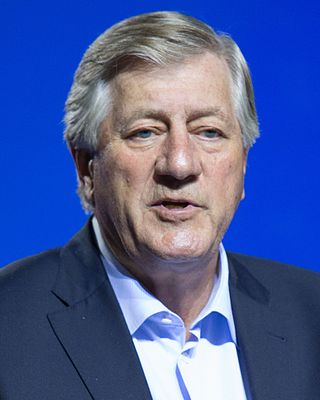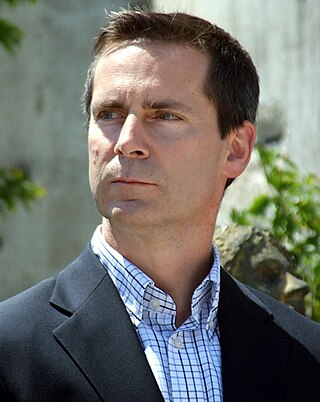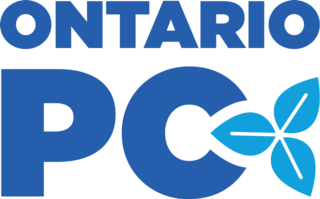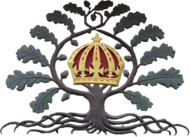A Tory is an individual who supports a political philosophy known as Toryism, based on a British version of traditionalist conservatism which upholds the established social order as it has evolved through the history of Great Britain. The Tory ethos has been summed up with the phrase "God, King, and Country". Tories are monarchists, were historically of a high church Anglican religious heritage, and were opposed to the liberalism of the Whig party.

The Canadian Alliance, formally the Canadian Reform Conservative Alliance, was a centre-right to right-wing federal political party in Canada that existed under that name from 2000 to 2003. The Canadian Alliance was the new name of the Reform Party of Canada and inherited many of its populist policies, as well as its position as the Official Opposition in the House of Commons of Canada. The party supported policies that were both fiscally and socially conservative, seeking reduced government spending on social programs and reductions in taxation.

Charles Joseph Clark is a Canadian businessman, writer, and politician who served as the 16th prime minister of Canada from 1979 to 1980.

The Progressive Conservative Party of Canada was a centre to centre-right federal political party in Canada that existed from 1942 to 2003.

The Reform Party of Canada was a right-wing populist and conservative federal political party in Canada that existed under that name from 1987 to 2000. Reform was founded as a Western Canada-based protest movement that eventually became a populist conservative party, with strong Christian right influence and social conservative elements. It was initially motivated by the perceived need for democratic reforms and by profound Western Canadian discontent with the Progressive Conservative Party.

Ernest Preston Manning is a retired Canadian politician. He was the founder and the only leader of the Reform Party of Canada, a Canadian federal political party that evolved into the Canadian Alliance in 2000 which in turn merged with the Progressive Conservative Party to form today's Conservative Party of Canada in 2003. Manning represented the federal constituency of Calgary Southwest in the Canadian House of Commons from 1993 until his retirement in 2002. He served as leader of the Official Opposition from 1997 to 2000.

Ernest Larry Eves is a Canadian lawyer and former politician who served as the 23rd premier of Ontario from 2002 to 2003. A Progressive Conservative, he took over the premiership upon Mike Harris's resignation as party leader, but the party was defeated in the 2003 election by the Liberals, under Dalton McGuinty.

The 1993 Canadian federal election was held on October 25, 1993, to elect members to the House of Commons of the 35th Parliament of Canada. Considered to be a major political realignment, it was one of the most eventful elections in Canada's history. Two new regionalist parties emerged, finishing second and third in seat count. Most notably, the election marked the worst defeat for a governing party at the federal level and among the worst ever suffered by a governing party in the Western democratic world. In a landslide, the Liberal Party, led by Jean Chrétien, won a majority government.

Michael Deane Harris is a retired Canadian politician who served as the 22nd premier of Ontario from 1995 to 2002 and leader of the Progressive Conservative Party of Ontario from 1990 to 2002. During his time as party leader, he heavily nudged the Ontario PC Party to Blue Toryism, advocating for the "Common Sense Revolution", his government's program of deficit reduction in combination with lower taxes and budget cuts.
The Conservative Party of Canada, colloquially known as the Tories, is a federal political party in Canada. It was formed in 2003 by the merger of the two main right-leaning parties, the Progressive Conservative Party and the Canadian Alliance, the latter being the successor of the Western Canadian–based Reform Party. The party sits at the centre-right to the right of the Canadian political spectrum, with their federal rival, the Liberal Party of Canada, positioned to their left. The Conservatives are defined as a "big tent" party, practising "brokerage politics" and welcoming a broad variety of members, including "Red Tories" and "Blue Tories".

The Ontario Liberal Party is a political party in the province of Ontario, Canada. The party has been led by Bonnie Crombie since December 2023.
The phrase Common Sense Revolution (CSR) has been used as a political slogan to describe conservative platforms with a main goal of reducing taxes while balancing the budget by reducing the size and role of government. It has been used in places such as Australia and Canada. This article deals with the "Common Sense Revolution" as it was under Ontario Premier Mike Harris and the Progressive Conservative Party of Ontario from 1995 to 2002.

The 2003 Ontario general election was held on October 2, 2003, to elect the 103 members of the 38th Legislative Assembly of the Province of Ontario, Canada.

The Progressive Conservative Party of Ontario, often shortened to the Ontario PC Party or simply the PCs, colloquially known as the Tories, is a centre to centre-right political party in Ontario, Canada.
A Red Tory is an adherent of a centre-right or paternalistic-conservative political philosophy derived from the Tory tradition; it is most predominant in Canada, but also has a presence in the United Kingdom. This philosophy tends to favour communitarian social policies, while maintaining a degree of fiscal discipline and a respect of social and political order. It is contrasted with "Blue Tory" or "High Tory". Some Red Tories view themselves as small-c conservatives.
The Progressive Conservative Association of Alberta was a provincial centre-right party in the Canadian province of Alberta that existed from 1905 to 2020. The party formed the provincial government, without interruption, from 1971 until the party's defeat in the 2015 provincial election under premiers Peter Lougheed, Don Getty, Ralph Klein, Ed Stelmach, Alison Redford, Dave Hancock and Jim Prentice. At 44 years, this was the longest unbroken run in government at the provincial or federal level in Canadian history.

The Province of Ontario is governed by a unicameral legislature, the Legislative Assembly of Ontario, which operates in the Westminster system of government. The political party that wins the largest number of seats in the legislature normally forms the government, and the party's leader becomes premier of the province, i.e., the head of the government.
Conservatism in Canada is generally considered a movement which is primarily represented by the modern-day Conservative Party of Canada in federal party politics, as well as various centre-right and right-wing parties at the provincial level. Far-right politics have never been a prominent force in Canadian society. The first party which called itself "Conservative" in what would become Canada was elected in the Province of Canada election of 1854.
This article covers the history of the Conservative Party of Canada.













